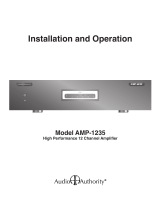AudioSource AMPSUB210 Owner's manual
- Category
- Audio amplifiers
- Type
- Owner's manual

OWNER’S MANUAL
AMPSUB210
Congratulations on your purchase of the AudioSource® AMPSUB210.
Please take a few moments to read this entire manual, and be sure to
retain this document for future reference. Please read and observe all
safety instructions detailed on page 2.
NOTE: if any part of this product is damaged or missing, please call your
dealer or AudioSource® directly at 1.800.435.7115 or 503.286.9300.
Please read your warranty and retain your receipt and original carton for
possible future use.
For more information about AudioSource® electronics, speakers and
accessories please visit www.audiosource.net
AMPSUB210
Home Audio Subwoofer Power Amplifier
AudioSource®
9200 North Decatur St.
Portland, OR 97203
503.286.9300
ww
w.audiosource.net
AMPSUB210 Owner
’s Manual 8100.0361A
FEATURES:
Line 1 / Line 2 priority input switching
Line 2 auxiliary output
High level input
Front panel volume control
Front panel 40Hz-500Hz variable crossover control
Front panel 5Hz-50Hz subsonic filter control
Front panel diagnostic LEDs
Signal sensing “Power On”
12VDC “Trigger On”
Triple-Darlington Power Amplifier Stages
Dual-differential error amplifiers
Output Limiter switch
Rack-mount ready

AMPSUB210
OWNER’S MANUAL
9200 North Decatur St. Portland, OR 97203 • 503.286.9300 • www.audiosource.net
2
• TO PREVENT FIRE OF SHOCK HAZARD, DO NOT USE THIS PLUG WITH AN EXTENSION CORD, RECEPTICLE OR OTHER OUTLET UNLESS THE
BLADES CAN BE FULLY INSERTED TO PREVENT BLADE EXPOSURE.
• TO PREVENT FIRE OR SHOCK HAZARD, DO NOT EXPOSE THIS APPLIANCE TO RAIN OR MOISTURE
• TO PREVENT ELECTRICAL SHOCK, MATCH WIDE BLADE PLUG TO WIDE SLOT, FULLY INSERT.
CAUTION
RISK OF ELECTRICAL SHOCK
DO NOT OPEN
CAUTION: TO REDUCE THE RISK OF ELECTRIC SHOCK, DO NOT REMOVE THE COVER. NO
USER SERVICABLE PARTS INSIDE. REFER SERVICING TO QUALIFIED PERSONNEL!
IMPORTANT SAFETY INSTRUCTIONS
1. Read these instructions.
2. Keep these instructions.
3. Heed all warnings.
4. Follow all instructions.
5. Do not use this apparatus near water.
6. Clean only with dry cloth.
7. Do not block any ventilation openings. Install in accordance with the
manufacturer’s instructions.
8. Do not install near heat sources such as radiators, heat registers, stoves,
or other apparatus (including amplifiers) that produce heat.
9. Do not defeat the safety purpose of the polarized or grounding type
plug. A polarized plug has two blades with one wider than the other. A
grounding type plug has two blades and a third grounding prong. The
wide blade or third prong are provided for your safety. If the provided plug
does not fit into your outlet, consult an electrician for replacement of the
obsolete outlet.
10. Protect the power cord from being walked on or pinched particularly at
the plugs, convenience receptacles, and at the point where they exit from
the appliance.
11. Only use attachments or accessories specified by the manufacturer.
12. Unplug the apparatus during lightning storms or when unused for long
periods of time.
13. Refer all servicing to qualified personnel. Servicing is required when the
apparatus has been damaged in any way, such as power supply cord or
plug is damaged, liquid has been spilled or objects have fallen into the
apparatus, the apparatus has been exposed to rain or moisture, does not
operate normally, or has been dropped.
MAGNETIC FIELD: !!CAUTION!! Do not locate sensitive high-gain equipment such as preamplifiers or tape decks directly above or below the unit. Because
this amplifier has a high power density, it has a strong magnetic field, which can induce hum into unshielded devices that are located nearby. The field is
strongest just above and below the unit. If an equipment rack is used, we recommend locating the amplifier(s) in the bottom of the rack and the preamplifier
or other sensitive equipment at the top.
EXPLANATION OF
SAFETY SYMBOLS
The exclamation point within an equilateral triangle is intended to alert the user of the presence of important
operating and maintenance (servicing) instructions in the literature accompanying the appliance.
The lightning flash with the arrowhead symbol within an equilateral triangle is intended to alert the user to the
presence of uninsulated “dangerous voltage” within the products’ enclosure that may be of sufficient magnitude
to constitute a risk of electric shock to persons.

AMPSUB210
OWNER’S MANUAL
9200 North Decatur St. Portland, OR 97203 • 503.286.9300 • www.audiosource.net
3
Technical Support
If any part of this product is damaged or missing, please call your dealer or
AudioSource® directly at toll free 1.800.435.7115 or locally 503.286.9300.
Limited Warranty
AudioSource® warrants its amplifier products against defects in materials
and workmanship for a limited period of time. For a period of two years from
date of original purchase, we will repair or replace the product, at our option,
without charge for parts and labor. Customer must pay all parts and labor
charges after the limited warranty period expires. The limited warranty period
for factory refurbished products expires after ninety (90) days from date of
original purchase.
This limited warranty applies only to purchases from authorized AudioSource®
electronics retailers. This limited warranty is extended only to the original
purchaser and is valid only to consumers in the United States.
Consumers are required to provide a copy of the original sales invoice from
an authorized AudioSource® dealer when making a claim against this limited
warranty. This limited warranty only covers failures due to defects in materials
or workmanship that occur during normal use. It does not cover failures
resulting from accident, misuse, abuse, neglect, mishandling, misapplication,
alteration, faulty installation, modification, service by anyone other than
AudioSource®, or damage that is attributable to Acts of God. It does not
cover costs of transportation to AudioSource® or damage in transit. The
customer should return his defective product, freight prepaid and insured, to
AudioSource® only after receiving a Return Authorization.
This warranty will become void if the serial number identification has been
wholly or partially removed, altered or erased. Repair or replacement under
the terms of this warranty does not extend the terms of this warranty. Should
a product prove to be defective in workmanship or material, the consumer’s
sole remedies will be repair or replacement as provided under the terms
of this warranty. Under no circumstances shall AudioSource® be liable for
loss or damage, direct, consequential or incidental, arising out of the use of
or inability to use the product. There are no express warranties other than
described above.

Power
AMPSUB210
OWNER’S MANUAL
9200 North Decatur St. Portland, OR 97203 • 503.286.9300 • www.audiosource.net
4
1. Power
The front panel power switch switches the AMPSUB210 on or off. Red
LEDs behind the faceplate indicate power status. Whenever the amplifier’s
power switch is in the “ON” position the ring around the button is illuminated.
When the amp is “Active” (receiving signal) the side lenses become
illuminated and the signal LED shows green. During “Standby” status (no
signal) the side lenses are not illuminated and the signal LED shows orange.
2. Signal LED
4. Subsonic Filter
Set between 5Hz and 50Hz to filter out unwanted lower frequencies.
5. Variable Crossover
Sets crossover frequency between 40Hz and 500Hz.
FRONT PANEL CONTROLS
7. Line 1 Input
A switching input that can be used if a second source is desired and will
take over when a signal is present and has at least a 5mV level. Whenever
there is no signal at this input, or a signal with less than 5mV level, the
amplifier switches back to the Line 2 or “primary” input.
8. Speaker Level Input Line Select
Switches the input of the speaker level input to Line 1 or Line 2.
9. Speaker Level Input
Can be used to connect a source with speaker level output instead of line
level outputs. Use the Speaker Level Input Line Select to route the source
to Line 1 or Line 2.
10. Line 2 Input/Output
The primary line level input and output for a single source connection.
11. LFE Input
Optional connection to LFE output from your receiver. Bypasses amplifier
volume control, use receiver to set levels. Also set Variable Crossover to
full clockwise position (500Hz) and Subsonic Filter slightly lower than your
woofer’s F3 point, or between 9 and 12 o’clock if woofer specs unavailable.
See block diagram (figure 5) on page 5.
12. Soft Limiter Switch
When “ON” reduces extreme signal peaks which may damage your speakers
and cause audible distortion.
13. 12V Trigger
Allows the AMPSUB210 to be powered on by other electronics or to power
on other electronics via a 3.5mm mini phone plug cable.
14. Power Mode
Sets the power on option of the AMPSUB210. Set it to Normal for manual
power on/off. Set to Auto-On for signal sensing. Set to Trigger if the 12V
Trigger input is used.
15.
16. Speaker Output
Dual internally bridged speaker output terminals. If connecting two speakers
they must be minimum 8 ohms each. DO NOT BRIDGE.
17. Mains Power Inlet & Fuse Holder
Accepts IEC type line cord. A fuse in the integrated holder provides safety
protection from fault conditions: replace fuse with one of same type
and rating only.
18. Mains Voltage Selector
Voltage selection switch is preset to 115V (USA). For use in areas which
require 230V contact your dealer. Fuse must be of type and rating marked
on amplifier for use at local mains voltage.
REAR PANEL CONTROLS
6
4
1
7
8
9 10 11
12
13
14
Figure 1. Front Panel
Figu
re 2. Rear Panel
2 3
3. Clip LED
Blinks red during signal clipping or protect. For clipping: reduce volume
slightly. For protect: check speaker wires for shorts or extreme low
impedance (< 4 ohms).
Light Bar Display Control
Turns light bar display on front panel on or off. Does not control Signal/Clip
LEDs or power button light ring.
Signal Clip
AMPSUB210
Subwoofer Power Amplifier
Min
Max
Volume
Min
Max
Volume
40Hz
500Hz
Variable
5Hz
50Hz
Subsonic
5
6. Volume Control
Adjusts amplifier volume.
-
IN
L
L
R
L
R
R
Speaker IN
IN OUT
Line 1 Line 2
Line 1 Line 2
+ +
- -
V
V
Serial Number:
IN
OUT
12V Trigger
+
Trigger Normal
Auto On
115V~ 60Hz 700W
FUSE:T6.3AL 250V
FUSE:T3.15AL 250V
230V~ 50Hz 700W
MODEL AMPSUB210
Custom Manufactured in China
CAUTION: See User Manual Before
Replacing Fuse
-
+
-
+
Use Class 2 Wiring
Minimum Impedance:
4 ohms Combined Load
AVIS: RISQUE DE CHOC ELECTRIQE
NE PAS OUVRIR CE CARTER
RESERVE AU PERSONNEL AUTORISE
RISK OF FIRE OR ELECTRIC SHOCK
DO NOT OPEN
CAUTION: TO PREVENT ELECTRICAL SHOCK DO NOT REMOVE
COVER. NO USER SERVICEABLE PARTS INSIDE. REFER SERVICING TO
QUALIFIED PERSONNEL.
WARNING: TO PREVENT ELECTRICAL SHOCK DO NOT REMOVE
COVER. NO USER SERVICEABLE PARTS INSIDE. REFER SERVICING TO
QUALIFIED PERSONNEL.
CAUTION AVIS
LFE
IN
Limiter
ON OFF
On Off
Light Bar Display
15
16
17
18
4
5

AMPSUB210
OWNER’S MANUAL
9200 North Decatur St. Portland, OR 97203 • 503.286.9300 • www.audiosource.net
5
FRONT PANEL CONTROLS
The front panel power switch switches the AMPSUB210 on or off. Red
LEDs behind the power button lens indicate power status. Whenever
the amplifier’s power switch is in the “ON” position and the amplifier is in
“Active” status the Signal LED is illuminated green. If the amplifier
is “ON” but in “Standby” status the Signal LED will illuminate orange.
REAR PANEL CONTROLS
The AMPSUB210 can be turned on and off independently via the power
switch on the front panel, by signal sensing, or remotely by a triggered
DC input. Switch
14
, located on the lower edge of the rear panel of the
amplifier, selects turn-on functions of the AMPSUB210. If you would like to
control the unit’s power on / power off status manually from the front, place
the switch in the “Normal” position. If you would like to control the unit’s
power-on / power-off status by means of signal sensing, place the switch
in the “AUTO ON” position. If you would like to control the unit’s power-on /
power-off status by a DC remote trigger, place the switch in the “TRIGGER”
position, and connect the remote triggering cable from your triggering
device to the jack labeled “IN” next to the switch. When using 12V Trigger
or Auto On mode, the unit’s power button will be pushed in and the status
LEDs will be illuminated orange in standby condition.
Use a 3.5mm phone plug (in the “IN” connector) to make this connection:
the tip of the connector is (+) positive, and the sleeve of the connector is
(-) negative. A second jack in the same block is labeled “OUT”. This allows
for remote turn-on of other devices when the AMPSUB210 is powered on.
Use the same polarity for the terminals of this plug. Please read the owner’s
manual for any devices you are attempting to connect in this manner to
ensure compatibility.
Note: The front panel power switch must be in the “ON” position for the 12V
triggers or “Auto ON” features to operate.
RCA INPUT/OUTPUT
There are 2 pairs of RCA inputs on the back panel of the AMPSUB210.
These RCA inputs are labeled as “Line 1 IN” and “Line 2 IN”. They are
also designated with an “R” or an “L” as Right channel or Left channel
inputs respectively.
“Line 2 IN” should be used as the “primary” or normal input for various
line level sources that may be available to the amplifier. “Line 1 IN” is
a switching input that should be used when a second local source is
connected, and will take over as the selected input whenever a signal
with a minimum of 5mV of level is present. Whenever there is no
signal at the “Line 1 IN” RCAs, or a signal with less than 5mV level, after
a 4 second delay, the input will revert back to the normal Line 2 input signal.
SPEAKER LEVEL INPUT
The AMPSUB210 provides a pair of speaker level inputs for those
applications where either of the sources has only speaker level output signal
available. The switch routes the speaker level signal to either the Line 1 or
Line 2 input.
Figure 3. 12V Trigger Figure 4. Power Mode
Figu
re 6. RCA Inputs
9
10&7
-
IN
OUT
12V Trigger
+
Trigger Normal
Auto On
IN
L
L
R
L
R
R
Speaker IN
IN OUT
Line 1 Line 2
Line 1 Line 2
+ +
- -
V
V
Figure 5. LFE Block Diagram
LFE Input
Left Input
Left Output
Right Input
Right Output
High Level
Input
Gain
18dB Variable
Subsonic Filter
(5-50Hz)
18dB Variable
Crossover
(40-500Hz)
Selectable
Soft Limiter
Power Amplifier
To Speaker
The built in delay of 4 seconds will automatically, in most instances,
accommodate the nature of the source connected to the “Line 1 IN”
RCAs. As an example, if the “Line 1 IN” source was a CD Changer, the
delay should be enough to prevent switching back to the “Line 2 IN”
source while the changer moves from one disc to another.

AMPSUB210
OWNER’S MANUAL
9200 North Decatur St. Portland, OR 97203 • 503.286.9300 • www.audiosource.net
6
SPEAKER TERMINALS
Terminals are provided for two subwoofers. Connect the speaker’s positive (red)
terminal to the amplifier’s positive (red) terminal, and the speaker’s negative
(black) terminal to the amplifier’s negative (black) terminal.
NOTE: Use the appropriate gauge speaker wire when connecting speakers
to the AMPSUB210.
If using two speakers they must be a minimum of 8 ohms each. DO NOT BRIDGE.
The speaker terminals are internally bridged.
MAINS POWER INLET/FUSE/
VOLTAGE SELECTOR
Power inlet accepts the IEC type line cord supplied with the amplifier. A fuse
in the integrated holder provides safety protection from fault conditions:
replace fuse with one of same type and rating only.
This amplifier is configured for operation at 115V ~60Hz. (North America)
The AMPSUB210 can be configured for operation from either 115V ~60Hz
or 230V ~50Hz AC mains. Installed mains fuse must be of type and rating
marked on amplifier corresponding to configured AC mains voltage.
Should you wish to configure the AMPSUB210 for use 230V ~50Hz
please contact your dealer or distributor.
Figure 8. Speaker Terminals
16
17 18&
LIGHT BAR DISPLAY
15
On Off
Light Bar Display
This switch controls the lighted bars on the front of the amplifier. These bars
light red when the amplifier is in operation. If the amplifier is visible and a low
light setting is desired use this switch to turn off the light bars. The other LED
indicators on the front panel as well as the power button lighted ring are not
affected by this control.
Figure 7. Light Bar Display Control
-
+
-
+
Use Class 2 Wiring
Minimum Impedance:
4 ohms Combined Load
115V~ 60Hz 700W
FUSE:T6.3AL 250V
FUSE:T3.15AL 250V
230V~ 50Hz 700W
MODEL AMPSUB210
Custom Manufactured in China
CAUTION: See User Manual Before
Replacing Fuse
Figure 9. Mains Power Inlet/Fuse/Voltage Selector

AMPSUB210
OWNER’S MANUAL
9200 North Decatur St. Portland, OR 97203 • 503.286.9300 • www.audiosource.net
7
APPLICATIONS
SINGLE SOURCE SETUP
In this configuration the amplifier plays a single source such as home theater or
home stereo. Connect the line out jacks from a stereo preamplifier or receiver to
the Line 2 input jacks of your AMPSUB210. (Figure 10) Next connect your speakers
to the terminals observing proper polarity (see “Speaker Terminals” Page 6).
SETUP FOR MULTIPLE SOURCE
In the application shown in Figure 11, a distributed audio system is connected
to the AMPSUB210 as a local zone amplifier via the Line 2 inputs. Normally
the distributed audio system will be the audio source for the AMPSUB210. The
distributed audio is then passed on to be used by additional zones or sub zones
in the distributed system via the Line 2 outputs.
The audio output of a local sou
rce, such as an MP3 Player, CD, television,
computer, etc., is connected to the AMPSUB210 via the Line 1 inputs, and
whenever the local source is active its signal will take priority over the distributed
audio signal present at Line 2 . However, the distributed audio signal will still
be present at the Line 2 input. In this circumstance the audio output of the
local source will be heard via the AMPSUB210. Once the local source is turned
off or muted, the AMPSUB210 will automatically switch back the distributed
audio system as an audio source, assuming the local source remains inactive.
The delay time of 4 seconds determines when switch back to the normal source
will occur. This set up assumes all incoming signals are at line level and not at
speaker level.
If the whole house distributed audio is only available as a speaker level signal
you can connect it to the “Speaker In” connections and set the routing switch
to the “Line 2” position, the right hand position of the switch (Figure 12).The AMP
SUB210 will no longer be able to pass the Whole House Distributed Audio to
another zone via the Line 2 Output. If you have any questions regarding how to
set this up, please call AudioSource® Tech support at 1.800.435.7115
Figu
re 10. Single Source Setup
Figure 11. Line Level with Multiple Sources
Figu
re 12. Speaker Level with Multiple Sources
IN
L
L
R
L
R
R
Speaker IN
IN OUT
Line 1 Line 2
Line 1 Line 2
+ +
- -
V
V
(From Pre-amp Line Out)
IN
L
L
R
L
R
R
Speaker IN
IN OUT
Line 1 Line 2
Line 1 Line 2
+ +
- -
V
V
(From Pre-amp Line Out)
(From Local Source Line Out)
(Out to Additional Zones)
IN
L
L
R
L
R
R
Speaker IN
IN OUT
Line 1 Line 2
Line 1 Line 2
+ +
- -
V
V
(From Local Source Line Out)
(Speaker Level Input)
SETUP FOR LFE INPUT
LFE
IN
Some home theater receivers have LFE Output. This bypasses the amplifier
volume control, so use the receiver to set levels. Also set Variable Crossover
to full clockwise position (500Hz) and Subsonic Filter slightly lower than your
woofer’s F3 point, or between 9 and 12 o’clock if woofer specification is
unavailable. See block diagram (figure 5) on page 5.
4
5
Figure 13. Optional LFE Input
(From LFE Output on Receiver)
Page is loading ...
Page is loading ...
Page is loading ...
Page is loading ...
Page is loading ...
Page is loading ...
Page is loading ...
Page is loading ...

AMPSUB210 SPECIFICATIONS
8 ohm Power: 200W RMS total at 8 ohms,
20Hz - 500Hz, <0.1% THD+N
4 ohm Power: 300W total at 4 ohms,
20Hz- 500Hz, <0.1% THD+N
Frequency Response: 5Hz - 500Hz, +0dB, -3dB
Signal to Noise Ratio: 100dB A-weighted, referred to rated
power at 4 ohms
Sensitivity: Variable, 350mV to 2.8V for rated
power at 8 ohms
AC Power Consumption: 700W maximum
Net Weight: 23.1lbs / 10.5kgs
Gross Weight: 30.8lbs / 14.0kgs
AudioSource®
9200 North Decatur St.
Portland, OR 97203
503.286.9300
ww
w.audiosource.net
AMPSUB210 Owner
’s Manual 8100.0361A
AMPSUB210
OWNER’S MANUAL
3.8”
(96.5mm)
16.5” (419mm)
13.75”
(349mm)
Power
Signal Clip
AMPSUB210
Subwoofer Power Amplifier
Min
Max
Volume
Min
Max
Volume
40Hz
500Hz
Variable
5Hz
50Hz
Subsonic
-
 1
1
-
 2
2
-
 3
3
-
 4
4
-
 5
5
-
 6
6
-
 7
7
-
 8
8
-
 9
9
-
 10
10
-
 11
11
-
 12
12
-
 13
13
-
 14
14
-
 15
15
-
 16
16
AudioSource AMPSUB210 Owner's manual
- Category
- Audio amplifiers
- Type
- Owner's manual
Ask a question and I''ll find the answer in the document
Finding information in a document is now easier with AI
in other languages
Related papers
-
AudioSource 12-Channel User manual
-
AudioSource 12-Channel User manual
-
AudioSource Home Theater Speakers User manual
-
AudioSource AMP800VS Owner's manual
-
AudioSource Remote Controlled Powered Subwoofer with Active Stereo Crossover and High Intensity Video Shielding User manual
-
AudioSource Powered Subwoofer with Build-in Active Stereo Crossover and High Intensity Video Shielding User manual
-
AudioSource AD3002 Owner's manual
-
AudioSource LS445 Installation guide
-
AudioSource Powered Subwoofer with Active Stereo Crossover and High Intensity Video Shielding User manual
-
AudioSource SYSTEM 380 User manual
Other documents
-
OSD Audio SMP500DSP Mono Subwoofer Power Amplifier Owner's manual
-
 Phoenix Gold RSD500.4 User manual
Phoenix Gold RSD500.4 User manual
-
Tangent Evo E5A User manual
-
 Phoenix Gold RSd600.1 User manual
Phoenix Gold RSd600.1 User manual
-
Boston Classic CS 2310 Owner's manual
-
 Phoenix Gold RSD300.1 User manual
Phoenix Gold RSD300.1 User manual
-
 Audio Authority AMP-1235 Operating instructions
Audio Authority AMP-1235 Operating instructions
-
 Phoenix Gold RSd1200.1 User manual
Phoenix Gold RSd1200.1 User manual
-
OSD Audio MX880 Owner's manual
-
OSD Audio XMP300 2-Channel 150W Each Channel Owner's manual




















